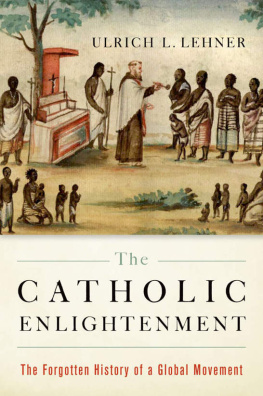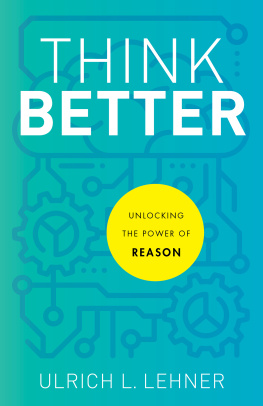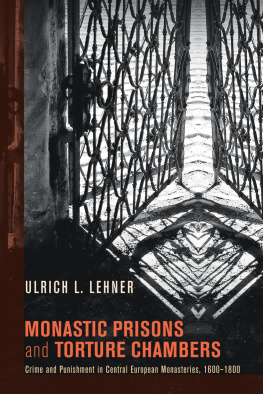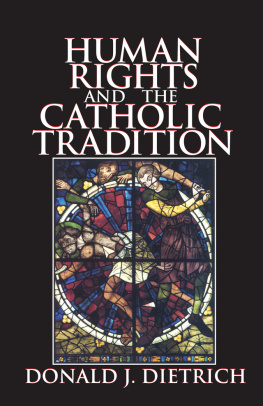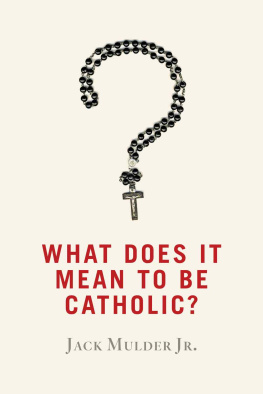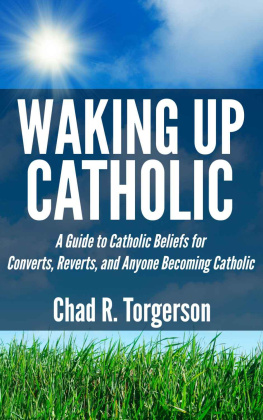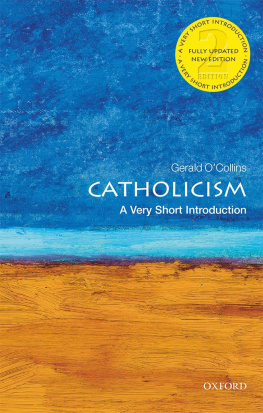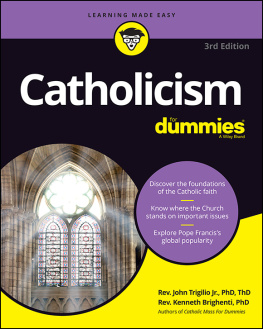The Catholic Enlightenment
The Catholic Enlightenment
The Forgotten History of a Global Movement

ULRICH L. LEHNER


Oxford University Press is a department of the University of Oxford. It furthers the Universitys objective of excellence in research, scholarship, and education by publishing worldwide.
Oxford is a registered trademark of Oxford University Press in the UK and in certain other countries.
Published in the United States of America by
Oxford University Press
198 Madison Avenue, New York, NY 10016, United States of America
Oxford University Press 2016
All rights reserved. No part of this publication may be reproduced, stored in a retrieval system, or transmitted, in any form or by any means, without the prior permission in writing of Oxford University Press, or as expressly permitted by law, by license, or under terms agreed with the appropriate reproduction rights organization. Inquiries concerning reproduction outside the scope of the above should be sent to the Rights Department, Oxford University Press, at the address above.
You must not circulate this work in any other form and you must impose this same condition on any acquirer.
Library of Congress Cataloging-in-Publication Data
Lehner, Ulrich L., 1976
The Catholic enlightenment : the forgotten history of a global movement / Ulrich L. Lehner.
pages cm
Includes bibliographical references and index.
ISBN 9780190232917 (cloth : alk. paper)eISBN 97801902329311.Catholic ChurchHistoryModern period, 15002.Enlightenment.I.Title.
BX1330.L44 2016
282.0903dc23
2015023905
Contents
The Catholic Enlightenment
Christianity claimed to bring light, hope, and truth, but its central myth was incredible, its dogma a conflation of rustic superstitions, its sacred book an incoherent collection of primitive tales, its church a cohort of servile fanatics as long as they were out of power and of despotic fanatics once they had seized control. Common to all was the conviction that new discoveries in science and philosophy should renew the faith. The religious Enlightenment cut across national and confessional lines. It drew in Lutherans, Calvinists, Unitarians, Catholics, Jews, and the Orthodox. It could be found in the heartlands of Europe but also on its periphery, in Lithuania and Poland, in Malta and Portugal, in the Americas, and even in India. Its leading lights believed they could create a more tolerant society, more efficient government, more effective education, improved morals, and greater happiness.
While many Protestant Enlighteners have received attention from historians, less has been said about the struggle of Catholicism to come to terms with the Enlightenment. Is such a thing as a Catholic Enlightenment even possible? Did Spain, Portugal, France, and their overseas colonies contribute to the Enlightenment or should they be seen as merely conservative Catholic regimes? Is Catholicism compatible with the values modernity cherishes?
When I began asking these questions, I was often greeted by frowning faces or sometimes patronizing smiles. I had the impression that my colleagues thought I was chasing sprites. I was told that Catholics did not believe in science, that they were superstitious, and that they were never great supporters of democracy. The Catholic Church had subjugated women, they said, and its missionaries had helped destroy the Native American population. The fact that my learned colleagues harbor such simplistic views has convinced me that it is necessary to tell the forgotten story of the Catholic Enlightenment. Long before there was a Pope Francis, there existed an open-minded Catholicism that was in dialogue with cutting-edge intellectual trends.
Why has this history been lost? A great deal of the blame falls on the church, which until the 1960s felt embarrassed that there was a positive engagement with the Enlightenment and decried it as heretical and un-Catholic. The other reason may be the lenses through which historians like Peter Gay looked at the Enlightenment: if only anti-religious thinkers were enlightened, then there could not be a Catholic Enlightenment. It would be a contradiction in terms. Therefore, historians did not bother to investigate with more thoroughness Catholic life of the eighteenth century until, due to the work of brave pioneers like R. R. Palmer, a more differentiated view began to take root. He, Bernard Plongeron, and many others have worked tirelessly to demonstrate that Catholicism and Enlightenment, faith and reason, progress and religion were not incompatible. It was these historians who also refuted the widespread misunderstanding that Catholicism equated with the papacy. In the eighteenth century, Catholicism was not centered around the pope but was much more locally organized. The pope certainly had a say, but often only a very limited one. In many countries, the pope could not even publish a public announcement without prior approval of state authorities. Thus, even if many popes proved to be enemies of the Enlightenment, it does not follow that Catholicism was hostile to it, too.
Yet a closer look at history reveals that many progressive reforms within the Catholic Church predate even the Enlightenment.Some of the most cherished values of modernity can be traced to the pre-Enlightenment Catholic Reform that began in the sixteenth century. The rejection of arranged marriages originated in the Catholic Reform movement, as did prohibitions against domestic abuse, criticism of the denigration of women, and also the protection of the indigenous tribes of South and Middle America, and much else.
Much of the blame for the neglect of this history lies with the Catholic Church itself. After the French Revolution, the church retreated to an intellectual ghetto from which it did not emerge until the twentieth century. During this dark period, any discussion of progressive Catholics was unwelcome; most were labeled heretics or persons of questionable character. Everything modern came under suspicion; modern thought was something to be denounced, not engaged. Not until the 1960s did sound historical studies of Enlightenment Catholicism begin to appear. It seems that, slowly, the Catholic Church is again beginning to reconcile with modernity, having realized that to shut out modernitywhich was common practice between 1850 and 1950only prevented the updating of theology and church practice. Many proposals that are hotly debated by Catholics todaya new role for the papacy, a preferential option for the poor, married priests, divorce and remarriagefirst emerged in the 1700s. Yet most Catholics are completely unaware that the question, How can I remain Catholic and yet be part of the modern world? is far from new. Looking at the answers of the past helps us to identify roads not taken, roads that led followers astray or into the abyssand perhaps even roads to which the church might return.
So what was the Catholic Enlightenment? To understand what was happening in the eighteenth century, one has to begin two hundred years earlier. When the Protestant Reformation shook Europe, Catholicism lost its hegemony. Suddenly new churches sprang up. They were divided on many things but agreed on one: that the Catholic Church had lost the true faith through corruption and decay. Getting over the shock, Catholics responded with a meeting of bishops, a council, in the city of Trent, which lasted from 1545 to 1563. The council addressed what had to be reformed in the churchfor example, it determined that future priests should be properly educated and guided to become authentic pastorsbut it also codified what Catholics believed in contrast to Protestants. Thus, for example, the council stressed that human freedom is a crucial feature of theology. This particular teaching was part of a new, more optimistic view of the human person: one could do good deeds without faith or divine help and could freely reject Gods grace. This prepared the ground for ongoing controversies over the question of predestination, but most of all it became the foundation of the Enlightenment belief in individual freedom and the natural capacities of the human person. It was the beginning of Catholic Reform, also called Tridentine Reform.

